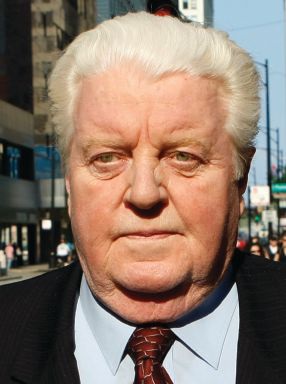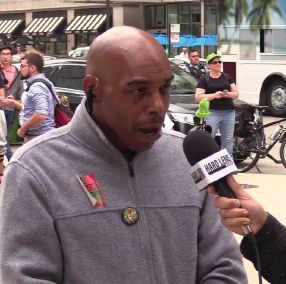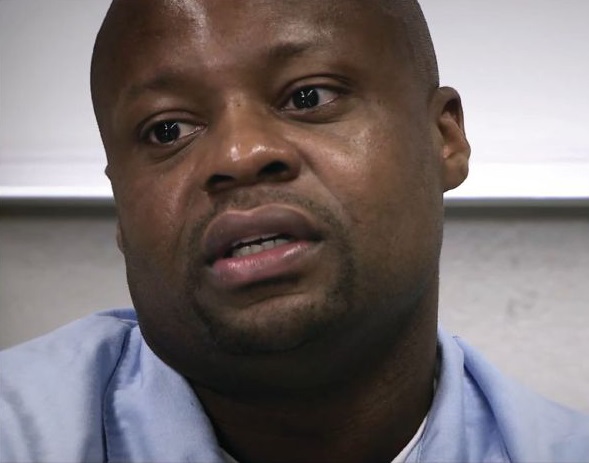When 42-year-old Chicago resident Marcus Wiggins discovered FaceTime, he was obsessed. His lawyer, Justin Bonus, described it as like the first-time sliced bread was invented. Mr. Wiggins was not around when FaceTime launched in 2011. He was in prison serving time for a crime his attorneys say he did not commit.
Mr. Wiggins’ attorneys, Justin Bonus and Jarrett Adams, both based in New York, have filed a petition for post-conviction relief in an effort to clear his name. Mr. Bonus is a criminal defense attorney with a specialty in post-conviction, appellate and trial work, and Mr. Adams is a criminal defense lawyer who was wrongfully convicted himself. He served nearly 10 years of a 28-year sentence and was exonerated.
“I don’t want to say that I believe Marcus is innocent. I know Marcus is innocent. There’s a difference,” Atty. Bonus told The Final Call.
The lawyer described Mr. Wiggins’ story as a “29 yearlong affair,” beginning in 1991. He was 13 years old when he was arrested on September 25, 1991 and charged with murder. “It started in 1991 when he was charged, and he was beaten. That case was dismissed, because they had no case against Marcus. But that took, what, four years. So, this is a teenager that lived with a homicide over his head for four years,” Atty. Bonus said.

A young Marcus said he was tortured while in police custody, and in 1993 when he was 15, his mother, Carolyn Wiggins, filed a lawsuit against the officers involved, which included James O’Brien, Fred Bonke and Kenneth Broudeau. Jon Burge, an ex-commander in the Chicago Police Department who was accused of torturing innocent Black people into confessing, was also named in the lawsuit. It was settled for $95,000.
The following year, officers O’Brien and Broudeau attempted to frame Mr. Wiggins for the 1994 murder of Rodney Collins, according to the post-conviction petition. But there was only one problem: Marcus was in school in another state: Wisconsin.
“He was actually physically in school. Had he been in the city of Chicago, there is the distinct possibility that he would have been charged in 1994 with the Rodney “This is very, disturbing.”
For Carolyn Johnson, Marcus’ mother, it was a harrowing ordeal. “In 1991 of September, my son was taken from me, and I was told by detective James O’Brien that I couldn’t go with him because he was being questioned for a shooting. So, he wouldn’t let me go with him and I didn’t know my rights,” said Ms. Johnson. “I just let them take him and I didn’t know that they had tortured him and spit in his face and beat him with a flashlight and electroshocked him and told him to confess to a crime he didn’t commit or didn’t know anything about,” she told The Final Call.
A history of corruption, torture
But Marcus’ nightmare was ongoing. In 1998, “Sgt. Fred Bonke arrived at the scene of the Theopolis Teague homicide, which occurred not far from where Marcus Wiggins resided. Sgt. Bonke took the reins, supervised the entire investigation, and brought his partners-in-crime, Detectives Boudreau and O’Brien, to frame Marcus Wiggins,” according to the post-conviction petition.
The three officers who were involved in the 1991 case and 1998 case all have a history of misconduct. Atty. Bonus said he found at least 54 claims of misconduct against officers Boudreau and O’Brien and that Fred Bonke has been the supervisor in cases where people were beaten.
According to the Citizens Police Data Project, which publishes information about police misconduct in Chicago, Kenneth Boudreau had 23 allegations, 75 percent more than other officers, and three use of force reports, 63 percent more than other officers. James O’Brien had 39 allegations, 89 percent more than other officers.
“All three of them were sued by Marcus in ‘93, and all three of them were involved in the prosecution in ‘98. What does that tell you?” Atty. Bonus questioned. “Would you want somebody that you sued prosecuting you, making the decisions, the discretion in your investigation?”
He said all three witnesses in the 1998 case have since recanted their statements. He also accused the officers of not caring. “They had no soul. There is no moral fiber. It’s make an arrest, close a case, prayerfully get a conviction. That is not what they’re there for. So, if that’s the case, the system itself is unjust, it’s built on water,” he said, “And then the prosecutor’s job is to vet what the police do. It’s not to push what the police do. What protection do we have as human beings, as citizens in America, if the people that we pay with our taxes aren’t working for us?”
Fred Bonke was trained and supervised by former commander Jon Burge. Mark Clements, a torture victim, was only 16 years old when he was arrested by Burge and the officers under his command in 1981, 10 years before Marcus’ story begins. He said in his case, officers grabbed his genitals. He said in Marcus’ case, “He had electrical shocks attached to the body area. He was beat. He was framed.”

Jon Burge was sentenced to four and a half years in federal prison in 2011 for lying about the tortures that took place under his leadership, and he was released in 2014. He died in 2018.
“They never knew that all that was gonna be exposed. They couldn’t cover it up. And I’m of the opinion and the belief, Burge got caught because he lied on a deposition in a federal suit,” said Wallace “Gator” Bradley, an “urban translator” and legal defense strategist. “They didn’t send him to the penitentiary because of torture. They sent him to the penitentiary because he lied on a deposition in a federal suit, saying that he didn’t know nothing about the torture. And that exposed everything. They felt like they had the perfect cover up for all those years. And they did,” said Mr. Bradley.
Mr. Clements, who now works as an organizer with the Chicago Torture Justice Center, said Marcus Wiggins’ torture in 1991 was a red flag.
“Unfortunately, the city of Chicago, they hid complaints that could be sustained against the police, and in hiding those complaints, it only furthered the cover up of conspiracy by the police department to engage and to protect the misconduct of those police officers,” he said.
When the system fails people like Mr. Wiggins, that means there are loopholes, Mr. Clements pointed out.
“It could be, in Chicago alone, thousands of Marcus Wigginses that were mistreated. Because in the city of Chicago, this agency that they have in place to investigate claims of police misconduct, those are people that are less willing to be truthful, as some of them have relationships with these officers,” he argued, speaking about COPA (Civilian Office of Police Accountability).
“Some of them have worked with these officers, and most important is that they are representing the interests of the city, opposed to representing the interests of human beings that have been victimized by members of the police department,” said Mr. Clements.
A nightmare toward healing
It’s a nightmare coming out of prison and seeing that society has flipped. “For people who were children who never dealt with the responsibilities in society and now they find themselves being locked behind cages, it’s what they say. It’s a mystery of how you’re going to survive,” he said.
Since being released, Mr. Wiggins has passed his driving test and has gotten a cell phone and computer. But some of the aftereffects listed by Mr. Bonus include paranoia and anxiety.
“One of the cops that was involved with his torture in ‘91 stuck his head in the room in the 1998 case when he was arrested and said, ‘We’re going to stick you with this one. You ain’t getting away with this,’” the lawyer recounted.
Mr. Wiggins is working on getting a job, and he has been receiving support from his mother and sister. He is still having headaches and nightmares, and he’s in counseling. His mother is just now getting back to herself. “Last year some time, I started getting better, because now I’m able to finish my goal I was trying to reach at being a private and public investigator. I didn’t get to finish it, because I had a nervous breakdown and everything, but I passed my first exam and I’m working on my second one,” she said. “This whole incident has opened my eyes and light into how corrupt the system is.”
Ms. Johnson described moments when she met with the Honorable Minister Louis Farrakhan of the Nation of Islam and his words of comfort. The first time was when her son testified for Victor Safforld, formerly Cortez Brown, another alleged torture victim under Jon Burge who was released from prison in Sept. 2010. Ms. Johnson described that she was in the court crying, and the women of the Nation of Islam consoled her.

During another time she met with the Minister, he talked to her and another mother about how good it was to see them fighting for their sons.
“He said but you mothers ain’t supposed to be out here fighting for your sons. Us men are supposed to be out here fighting for your sons,” said Ms. Johnson.
Next moves
Mr. Clements said there needs to be a citizen’s accountability council. Atty. Bonus said prosecutors need to start rejecting cases from the police.
“You have an incestuous relationship between prosecutors and police because the prosecutors need police to make cases. There is no true vetting system. A grand jury is not a vetting system, because the prosecutor puts the evidence into the grand jury as they see fit. There is no judge in a grand jury room. It is a private affair,” he said.
Both police officers and prosecutors need to be held accountable, there should be cameras on at all times at police stations and everything police and prosecutors do need to be recorded, he argued.
“Somebody independent should be involved with the police department and training them. They should not govern themselves, like internal affairs. When you talk about what should be done to change it, the system needs to be revamped, because right now the system is built on sand. The justice system,” continued Atty. Bonus.
He and Atty. Adams filed a motion Jan. 15 for pro hac vice, which will allow them to practice law in Illinois. He said it’s very early on in the case to clear Mr. Wiggins’ name, but they don’t need a hearing, said Atty. Bonus.
“I stepped in this case pro bono in August, and I was ready to file a motion by December. I was drafting late November. That is lightning speed, and you want to know why? Because he’s innocent,” he said.
Mr. Bradley commended The Final Call for telling the story of Marcus Wiggins.
“The White media don’t want to hurry up and come out and expose too much about the ingrained racism, because we find out now that racism is racism,” he said. “There is a level. It may be liberal racism. It may be conservative racism, but at the end of the day, it’s all racism.”













